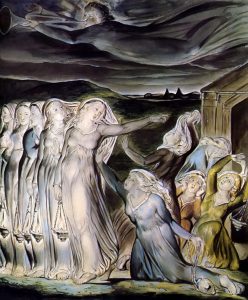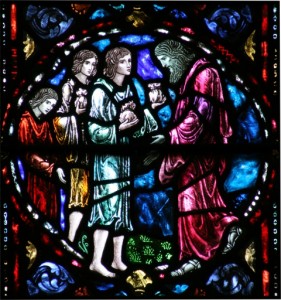Thoughts on Sunday’s Lessons for Nov. 8, 2020
First Reading (Track One): Joshua 24:1-3a,14-25
How do we follow God? When will Jesus come back? How does God save us, and what does that look like? Can we do anything to secure a place among those saved?

The Parable of the Wise and Foolish Virgins (1822), by William Blake (1757-1827). Watercolour and gouache on paper. Tate Gallery, London.
(Click image to enlarge.)
Sunday’s readings grapple with these eternal questions as the Pentecost season draws to a close and Advent approaches. We have to work to discern how these selections from Scripture might guide our lives. In the Track One first reading we hear the people renewing their covenant with God as they enter the promised land. They recall their long journey from slavery in Egypt, and they promise to be faithful to God, placing no other gods before God. But what do you think about the people’s gratitude that God drove out the Amorites who lived in the land to make a home for Israel? Does this troubling verse make you think about our treatment of the American Indians or Israel’s modern relationship with Palestine?
First Reading (Track Two): Wisdom of Solomon 6:12-16
The Wisdom of Solomon, often called simply “Wisdom,” is found in the Apocrypha, after the end of the Hebrew Bible. This passage echoes a memorable section of Proverbs that personifies Wisdom as a female voice, a strong woman who sits at the city gates, advises the people on right living, and was even a female presence who was with God at the moment of creation. This short Track Two first reading tells us how easy it is to find Wisdom: She meets us more than halfway and graciously meets us in our paths and thoughts.
Alternate First Reading (Track Two): Amos 5:18-24
The prophet Amos challenges us with a frightening question in this alternate Track Two first reading: What if we confidently await the day of God’s judgement, assuming that we have lived well, but learn to our shock that God has rejected our prayers and turned away? What if we run from a lion only to be eaten by a bear!? But there is hope. When we frame this passage in the verses that surround it, we find reassurance: When we seek good and not evil – when our justice and righteousness flow like mighty waters – then God will be with us.
Psalm (Track One): Psalm 78:1-7
We sing only the first seven verses of a long 72-verse hymn as our Track One Psalm this week; we heard the first four verses of this same Psalm just six weeks ago. In this short passage, the psalmist begins by calling the people to listen, for God is speaking. The psalmist speaks of parables and dark sayings of old, recalling the ancient stories that were passed on to the people. What God did for the people in the past must be told to a new generation. There is power, and almost a magical feel to these words calling the listener to pay attention. God commanded the children of Jacob to teach God’s ways to their children, the Psalmist reminds us, so that the next generations would know God and not forget God’s ways.
Psalm (Track Two): Wisdom of Solomon 6:17-20
This snippet from the Apocryphal book of Wisdom, offered as one of two alternate Track Two Psalm readings, follows directly after the alternate Track Two second reading. It nails down the importance of loving Wisdom and following her laws: It is the assurance of wisdom that draws us near to God and leads us to God’s kingdom.
Alternate Psalm (Track Two): Psalm 70
This alternate for the Track Two Psalm begins on a dark note to match the first reading from Amos. The Psalmist is beset by enemies who would not only kill him but enjoy his misfortune and gloat over his losses. The Psalmist wants a kind of justice that is very far from turning the other cheek: He wants to see those enemies suffer the shame and disgrace that they wish for him! The Psalmist is sure that the poor and needy who seek God can count on God’s protection, for God is great. But please, God, the Psalmist begs: Hurry, God, please. Don’t make us wait!
Second Reading: 1 Thessalonians 4:13-18
Paul offers the people of Thessalonika an imaginative description of the coming of Christ, complete with an archangel’s shout and trumpet blast, the dead rising from their graves and the people of God rising into the air! These ideas, taken literally, have become the basis for a lot of colorful theories about what the return of Christ might look like. Some Christians do read this passage as a literal prediction of the last days. But most bible scholars offer a simpler explanation: At the time of this letter – the earliest in the New Testament – many Christians still thought that Jesus would return and establish God’s kingdom while they were still alive to see it. But now it was a generation later, and some people were dying! Would they miss Jesus? No, says Paul. Be encouraged: All will be saved.
Gospel: Matthew 25:1-13
Jesus has concluded his long debate with the Scribes and Pharisees now and is seated with his disciples on the slopes of the Mount of Olives, from where they can see Jerusalem and the Temple. He starts telling them a parable with the words, “The kingdom of heaven will be like this,” a sure signal that what’s coming will challenge our expectations. Indeed, this story is just as unsettling as the other “kingdom” parables we’ve heard recently: the outcast who had no wedding garment; the murderous vineyard workers; and the workers who were all paid the same. In this story, the bridesmaids who didn’t plan ahead and had no oil for their lamps were locked out of the banquet. The bridegroom dismissed them, even though he was late, himself! Is Jesus trying to tell us that the kingdom of heaven is unfair? Surely not. Rather, the parable offers simple wisdom: We know that Jesus, the bridegroom, is coming, so be ready always.


